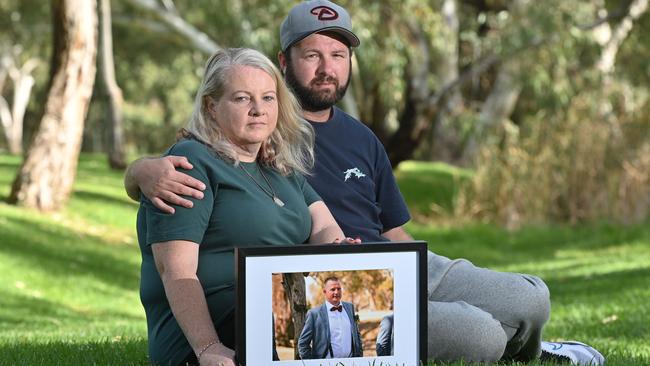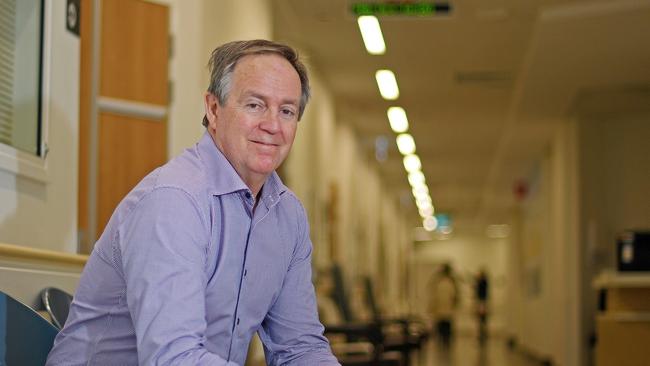We must act: Mental health chief’s emails warned of dysfunction and lack of resources crippling SA’s mental health system
Jacqueline Cosgrove is haunted and angry. This grieving mum is the face of SA’s mental health crisis, as a sacked whistleblower warns the system faces “utter chaos”.
SA News
Don't miss out on the headlines from SA News. Followed categories will be added to My News.
Four South Australian mental health patients are suspected of committing suicide in the past three weeks – one while in care and three within a week of being discharged.
One of their mothers wants answers. Jacqueline Cosgrove wants to know how much longer will the State Government allow an overstretched mental health system to continue to fracture – the magnitude of which was exposed this week by SA Health whistleblower John Mendoza.
So what was the last straw that led to Adjunct Professor Mendoza resigning and speaking out?
A series of emails, obtained by The Advertiser, reveals the desperate and repeated pleas made by him and his peers, which he claims were ignored by the Health Department hierarchy.

Emails that sounded the alarm
A series of emails from SA mental health whistleblower John Mendoza, obtained by the Advertiser, reveal persistent and escalating warnings of an “unsustainable, understaffed, dysfunctional” mental health system nearing emergency levels in March.
They were allegedly ignored by Health Department hierarchy.
Adjunct Professor Mendoza was terminated from his position as executive director of mental health for the Central Adelaide Local Health Network (CALHN) and South Australia’s prisons on Wednesday evening after publicly revealing the dire state of the mental health system post COVID-19.
The emails leading up to his termination were sent from February 28 to March 26, however Prof Mendoza said attempts to raise the alarm of a system under duress, and the provision of solutions, were made by him from as early as May last year.

Prof Mendoza’s emails to SA Health CEO Dr Christopher McGowan claim:
■ The flow of mental health demand and discharge is “bordering on clinically dangerous” levels, citing RAH patients stuck in ED for days in February and March despite 48 discharges from 61 available acute adult beds.
■ A “mute” response from the department on need for more staff – with 140 mental health nurse vacancies across CALHN and SALHN which cannot be filled. “Continuing neglect of (understaffing) will see our situation go from crisis to emergency this year,” he wrote.
■ A “wild and wacky” reform approach by the department including plans for opening a second Urgent Mental Health Care Centre in the Northern Area Local Heath Network (NALHN) and a Crisis Respite Centre in Mt Barker without clinical consultation. He said this was “a recipe for utter chaos”.
■ “Total neglect” of strategic supporters to help the system operate, and instead a departmental “obsession with micro management” – including proofing directors’ and CEOs’ communiques.
Last month, Prof Mendoza provided Dr McGowan with a seven-point rapid response plan to help quell the demand surge he expects will continue to be felt over the next five years.
“The only way to respond to the tragic state of affairs that exists here, and has existed for a long time, is in the short to medium term open more beds,” he says.
Prof Mendoza told the Advertiser that none of the seven points had been actioned.
Neither SA Health, nor Dr McGowan, responded directly to a series of questions sent by The Advertiser relating to the claims made in the emails by Prof Mendoza.
An SA Health spokeswoman said the department worked closely with clinicians to prioritise the health and wellbeing of all South Australians and that presentations to EDs fluctuated in time and at each hospital.
She said the department knew continued reform of mental health services was needed and was continuing to identify, implement and monitor new ways to improve it.
She said a new initiative would accelerate a six-month Graduate Diploma training program upskilling general nurses in mental health and providing greater education opportunities for nurses wanting to work in mental health.
She said initiatives to reduce mental health wait times in emergency departments had been set up through hospital avoidance programs and alternative care.
Health Minister Stephen Wade said: “The Marshall Liberal Government has provided record funding for mental health, including $20.4 million over two years for mental health support in response to the COVID-19 pandemic.”
The final straw for Mendoza
“Game over” for SA mental health director turned unemployed whistleblower John Mendoza was three weeks ago.
That’s when he realised nothing was going to change, the safety and care of his staff and patients was under real threat and “mental health priority” had become meaningless words.
Up until a few days ago, he was the executive director of mental health for the Central Adelaide Local Health Network (CALHN) and South Australia’s prisons.
“The breaking point for me was when the chief executive issued that directive,” Adjunct Professor Mendoza told The Advertiser.
On March 19, SA Health CEO Dr Christopher McGowan issued an unprecedented order allowing the state’s chief psychiatrist, Dr John Brayley, to shuffle mental health patients from overburdened hospitals like the Royal Adelaide Hospital to those under less stress.
It was a directive, says Prof Mendoza, that followed weeks of him persistently emailing Dr McGowan about the surging rate of demand pummelling the RAH emergency department.
“The emails were about a broken system, lack of decision-making, lack of action,” said Prof Mendoza.
The new directive by Dr McGowan acknowledged his worries.
But within a week, Prof Mendoza said Local Health Network (LHN) directors were scratching their heads because they had no policy or procedure on when and how to carry out the directive.
By the end of March – the week leading up to the busy emergency department period of Easter long weekend – they were still waiting for a response to pleas for more details.
So Prof Mendoza said CALHN began to share their mental health patients in peak times, only to find few the other LHNs would take their mental health patients – despite some having waited 60 hours in RAH emergency.
“That was it – it was game over for me,” Prof Mendoza said.
On March 26, he gave Dr McGowan notice of his resignation, to leave on May 14.
On Wednesday evening he received his marching orders after publicly revealing the dire state of the post-COVID-19 mental health system earlier that day.
His revelations were shocking – an almost 40 per cent increase in mental health ED presentation at the RAH in February compared with two years ago; forensic mental health patients occupying 1600 bed days at the RAH because there is no room at James Nash House; around 1500 mental health patients discharged from CALHN’s inpatient beds (a record); and hundreds more ED presentations at the RAH and Queen Elizabeth Hospitals assessed but not admitted.
He said the situation required 10 rapid responses.
At the top of the list is a minimum of eight more psychiatric intensive care beds for CALHN and country, rural and remote LHNs as soon as possible, as well as transferring all forensic patients out of acute mental health hospital beds to proper forensic mental health services by the end of this month.
“It’s going to get worse unless there is an urgent U-turn,” Prof Mendoza said.
His comments back a six-month mental health campaign run by The Advertiser and Sunday Mail which in October last year raised alarm bells over the state’s haemorrhaging mental health system.



